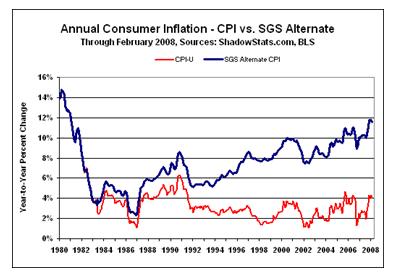Is the U.S. underreporting its inflation rate as determined by the Consumer Price Index (CPI)?
ShadowStats.com seems to think so. It’s alternative CPI indicator places inflation at nearly 12%, as opposed to official proclamations by the Federal government which puts inflation closer to 4%. From their website:
“Over a period of several years, straight arithmetic weighting of the CPI components was shifted to a geometric weighting. The Boskin/Greenspan benefit of a geometric weighting was that it automatically gave a lower weighting to CPI components that were rising in price, and a higher weighting to those items dropping in price.
“Once the system had been shifted fully to geometric weighting, the net effect was to reduce reported CPI on an annual, or year-over-year basis, by 2.7% from what it would have been based on the traditional weighting methodology. The results have been dramatic…
“The BLS publishes estimates of the effects of major methodological changes over time on the reported inflation rate… Changes estimated by the BLS show roughly a 4% understatement in current annual CPI inflation versus what would have been reported using the original methodology. Adding the roughly 3% lost to geometric weighting — most of which not included in the BLS estimates — takes the current total CPI understatement to roughly 7%.”
Although Shadow Stats’ argument largely has to do with how underreporting inflation has affected Social Security benefits, inflation affects the price of everything from commodities to consumer goods. Such an understatement of inflation would also prevent policy-makers from seeing troubling signs in the economy until it was too late.
Although the prices of oil and gold have started to come down from their all-time highs, experts are still worried about inflation:
“The dollar, though, may resume its decline because of growing pessimism about the US economy, which is already feared to be in a recession… ‘The problem is really the US economy. The recent data is melting down. The dollar is still on a downtrend,’ said David Mann, a currency strategist at Standard Chartered Bank.”
“Federal Reserve Bank of Dallas President Richard Fisher, who has dissented twice this year on interest-rate reductions, said inflation has risen to an ‘uncomfortable’ level and may stay high as the U.S. economy rebounds…
“‘We have inflationary pressures that are acting upon us,’ Fisher said at a community forum hosted by the Dallas Fed in Waco, Texas. If growth picks up ‘at a time inflation is at a high base, we create conditions for sustainable inflation over the long run.’”
It may be worse than he knows if Shadow Stats is to be believed.
ALG Perspective: There is a definite disconnect between reported inflation and the U.S. money supply more than doubling in the past 15 years, and the prices of oil and gold roughly doubling over the same period. Regardless of the motive for underreporting inflation, it’s short- and long-term implications could wind up being catastrophic for not only the U.S. economy, but for the world’s economy. The Congress needs to take a close look at both how the Federal Reserve’s loose dollar policies are weakening the dollar, and also about how exactly we do measure inflation. If Shadow Stats is correct (or even close to correct) we could be in deep, deep trouble – it would mean stagflation is already here. And worse, we would not even know it.


